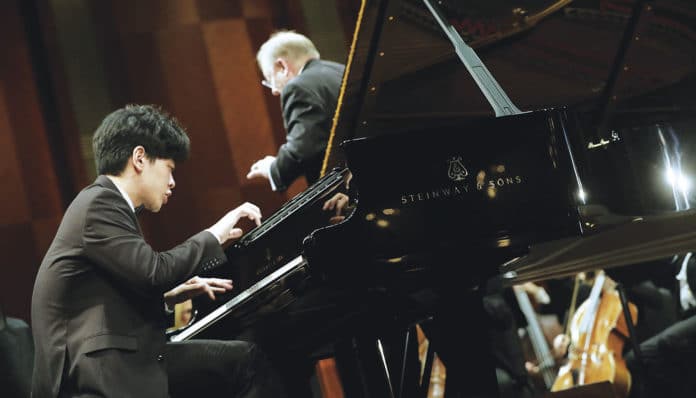There’s a lot more to being a Cliburn winner than the prestige that goes with the title. As in other professions, much goes on behind the scenes to ensure a long and successful career as a pianist.
Beyond the prestige, cash prizes and hours of rehearsal, the medalists of the Van Cliburn International Piano Competition get the opportunity to launch careers as concert pianists through concert bookings, recordings and significant media exposure via the career management prize.
This year’s top three recipients of the prize will be in town this week for Cliburn Winners Week, which began Nov. 5. The three, who are here for mentoring workshops with industry professionals, are gold medalist Yekwon Sunwoo, silver medalist Kenny Broberg and bronze medalist Daniel Hsu.
“The 1997 Cliburn opened the door to a performing career that I wouldn’t have had otherwise,” said Jon Nakamatsu, 1997 gold medalist. “My first appearance as the winner was three days after the award, and the touring has really never stopped. None of this would have been possible without the help and support of the Cliburn.”
The Cliburn works closely with each medalist to give personalized mentoring and advice as he or she adjusts to a busy concert schedule and life as a public figure and begins to form long-term plans. It’s all part of identifying extraordinary pianists with a clear artistic vision and giving them the platform to share their gifts, according to the organization.
“Since its beginning in 1962, the Cliburn has made concert bookings for its new winners a priority. Over the past 55 years, that program has grown into a comprehensive management program,” said Jacques Marquis, Cliburn president and CEO.
Marquis noted that the career management prize includes financial and tax planning help, administrative and tour management support, media and public relations services, and other details that go beyond the 88 keys of the piano.
“Other competitions do provide concert tours or some of these services, but the Cliburn is known for its concentration on this kind of support and for opening the U.S. market for these artists in particular,” he said.
The career management prize, including engagement fees the medalists will earn, is valued at over $1.5 million and includes:
*Over 200 concerts booked over three years across the United States (recital, chamber and orchestra);
*Partnership with London-based Keynote Artists Management for international management and concert bookings in Europe and Asia for the gold medalist;
*Internationally released recordings on Decca Gold;
*Complete public and media relations services: New York-based 8VA Music Consultancy for development of online presence (websites and social media) and assistance with media coaching, image consulting and publicity planning;
*International Advisory Council to provide a network of industry professionals who will be actively involved in career development; and
*Administrative services, including travel itineraries.
“First, our mission is to spread excellent classical music to as many people as possible and to discover and launch the careers of exceptional pianists,” Marquis said. “We do that through the unprecedented exposure we offer them.”
The 2017 competition webcast drew more than 5 million viewers in 170 countries over three weeks, Marquis said.
“But that is just one of the tools we use to achieve what all artists need to start a career. They need to play concerts,” he said. “Each winner is a representative of the Cliburn. They are ambassadors performing for patrons all over the world. The more they get to play, and the more supported they are during that pivotal time in their careers, the better for them and the better for the Cliburn.
“Secondly, our career management program is key to attracting the best young pianists to come to the competition every four years. A competition is only as good as the artists taking part in it. The best of the best want to come to the Cliburn because they want the engagements. They want careers as concert artists.”
The Cliburn provides individualized care for the three medalists during a three-year period. The idea is to help them develop artistically and to increase their awareness of what they want from their careers and what they need to do to get there.
Marquis said when most competitors come to the Cliburn, they are already considered professionals in that their primary source of income is playing the piano. Winning the Cliburn, though, takes their career to the next level.
“They have to be prepared to go out on the road directly after winning,” he said. “They have to have already developed their repertoire extensively and also be mentally and emotionally ready for such a career.”
Olga Kern, 2001 gold medalist, said that when she won the Cliburn competition, it was a dream come true. Once it became a reality, however, life got a lot busier, and she is still thankful for the career management prize.
“I got the life of a busy artist, with lots of concerts and opportunities to meet great musicians and collaborate with world-famous outstanding conductors,” she said.
Marquis said the Cliburn also wants to instill a fundamental understanding of the more practical aspects of sustaining their careers, from self-promotion, which is vital in today’s digital age, to taking care of themselves and their bodies during grueling travel schedules.
“Our goal is to transition our three medalists to professional management firms within three years of winning the Cliburn. We want to jump-start their careers and open doors, but then we need to find the right fit for each of them with a permanent general manager and, in most cases, regional managers” in the United States, Europe, and/or Asia, he said.
“At a little over a year prior to each competition, we begin booking concerts for the winners of that upcoming competition, so it’s important that we have transitioned the previous winners by that time.”






